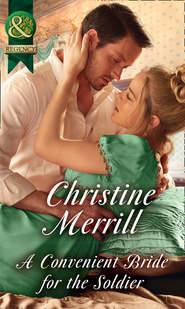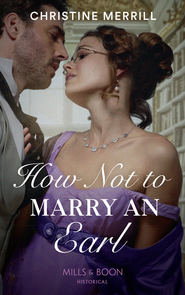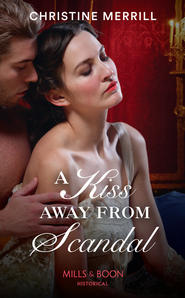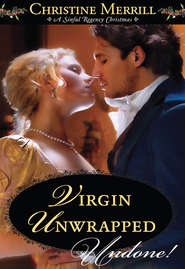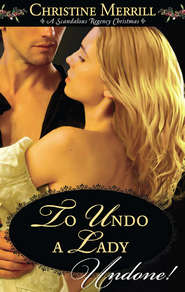По всем вопросам обращайтесь на: info@litportal.ru
(©) 2003-2024.
✖
A Ring from a Marquess
Настройки чтения
Размер шрифта
Высота строк
Поля
All her previous denials were for nothing. She knew these stones. She’d reset them herself and given them to Stephen Standish. But how had they come to be in her possession? And what was to happen to her now? Most importantly, how was she to explain to Stephen that she had sold his family’s gems back to him?
Unless he already knew.
Once the thought had entered her head, it pushed out all others. The stones had been in his family for generations. Surely he had recognised them from the first. Why had he said nothing to her? Had he been the one to send this man? To what purpose?
She was doing him an injustice by doubting him. He might be as innocent of this as she was. Or he might be in some trouble over this that she did not fully understand. Until she had spoken to him about the necklace, she would not be sure.
If she blurted what little she did know to this stranger, she might make matters worse for him and not better. What good would it do to declare her innocence, only to shift the blame and the disgrace on to the man she loved?
She stared down at the description of the rubies, doing her best to keep her face impassive. ‘I have no such stones at this time.’
‘Should we look in your locked room? Perhaps you might have forgotten.’
‘I am not likely to forget stones of this size. But if you insist.’ She led him to the room at the back of the shop, taking the key from the chain around her neck. Once inside, she removed the velvet-lined trays that held the loose stones to show him that they were indeed devoid of the things he was looking for.
He did not seem as surprised as he should have, if he’d truly expected to find them there. ‘You are sure you have not seen these stones before?’
It was a cleverly phrased question and one that she could not lie through so easily. It hinted that he knew exactly where the stones were and was awaiting her confession. ‘Do you doubt my word?’
By the flash of triumph in his eyes, she had given him the answer he expected. ‘I only know what I have learned from others. The name of your shop was mentioned in relation to the disappearance of the stones. It is why I have come to ask you about them.’
Her shop? Maybe Stephen had nothing to do with it. Her mind raced. Perhaps it had happened while Mr Montague was still alive. If he had been in the habit of buying stolen property, there was no telling how much of her current stock was compromised. How many such mistakes might she have to apologise for? And would all the people involved be as understanding as Mr Smith seemed?
Perhaps it was not so dire as that. But she would not know until she had searched the records and learned what she could about the rubies. But for Stephen’s sake, and her own, it would be wise to wait until she had learned all she could on the subject, before speaking to Mr Smith. ‘I know nothing of stolen necklaces,’ she said. ‘Nor do I understand why anyone would accuse me of such a thing.’
‘Let me explain the situation to you.’ Mr Smith gave her a sad, almost understanding smile. ‘You asked me earlier if I was a thief taker. I must tell you, in some cases, I would most prefer not to be. There are times when one has been led astray, or misinformed, or trusted those that were unworthy. Though they had no intention of breaking the law, those people find themselves in a great deal of trouble. They might be imprisoned, or even hung for a single mistake. But all it would take to avoid the difficulty is to admit the whole truth and return the stones to their rightful owner.’
‘If I had the stones, I should most certainly return them,’ she said, for that was perfectly true. Then she followed it with half a lie. ‘If I see them in the future, I will contact you immediately.’
‘That would be wise,’ he agreed. ‘I will give you a few days to think on the matter. Then I will return to see if you have anything to tell me.’
‘Of course, Mr Smith.’ She gave him her most co-operative smile. If the Duke of Larchmont wished to see her hang, innocence would not be enough to protect her. But she could swallow her pride and go to Justine with the story. The Felkirk family was more than strong enough to shield her from Mr Smith and his threats. ‘If I discover anything, I shall most assuredly tell you.’
‘Until then, good day, Miss de Bryun.’ He gave a slight respectful bow and exited the shop.
For a moment, Margot was frozen in place, unsure of what to do next. Then she glanced around her to be sure that the other customers in the shop had been too preoccupied to hear any of the exchange between herself and the thief taker. When she was sure that not even the nearest clerk had eavesdropped, she hurried to the little office she kept at the back of the workroom.
Once there, she brought down the account books, tracing her fingers down lines of sales until she found the records of shipments taken in. And there was a purchase of loose stones large enough to hide the Larchmont rubies.
Had the merchant passed the stones on to her? The man was a gypsy, but well connected, and the natural son of an earl. She’d never had reason to be suspicious of him before. But then, she’d never been accused of dealing in stolen merchandise.
She went to the files and found the detailed inventory of the purchase. It had been checked in by Mr Pratchet, the description of the gems written in his tidy hand. They were mostly opals, this time, and a nice selection of emeralds. It appeared that she’d had the best of a shipment from the Americas: Brazil, perhaps. And there, at the bottom of the list, were the rubies. Their description was identical to the one that Mr Smith had just shown her.
The pure red of those stones could only have come from Burma. What were they doing with Brazilian emeralds? Mr Pratchet had paid out more than she’d expected to spend on that order. But the amount listed for the rubies was less than a tenth of their actual value. The ink on the line did not seem to match the rest, as though the last item had been added as an afterthought. The total below it had been carefully altered to include the amount paid out for the stolen stones.
She stared at the books for what seemed like hours, trying to understand how she had not noticed before. But hadn’t Pratchet just demonstrated how careless she had become while fawning over the Marquess of Fanworth?
* * *
When the senior clerk, Jasper, came to her for permission to shut the shop, she gave an absent nod. The sun was near to setting. The other clerks had already gone home to their tea and the building had grown dark and quiet. She followed the boy out into the shop and locked the door the minute he was thorough it. Then she hurried back to the workroom.
If there was an explanation to any of this, it would lay with Pratchet. She went straight to the desk he used as a workbench and searched the drawers, not sure what she expected to find. More stolen gems? Thank God, there were none. Perhaps he was not responsible, after all. He might have been gulled, just as she had been, when presented with a fine bunch of loose stones and a price too good to resist.
But then she turned to the box of scrap gold on the floor beside the table, waiting to be melted and recast. It took only a few moments’ prodding to find the setting for the duchess’s rubies lying twisted and empty at the bottom.
‘What are you doing there?’ Mr Pratchet was standing in the doorway, watching as she rifled his workspace.
‘What are you still doing here?’ she said. For a moment, irrational instinct took her and her eyes darted around the room, searching for a defensive weapon.
‘I forgot to take my coat...’ As he stared at the broken necklace in her hand, his voice trailed away, reminding her that such fear was overblown. He might be a thief, but he was an unprepossessing specimen who would not further risk his livelihood by attacking her.
‘You know what I am doing.’ She held the setting out in front of her, so that there could be no denying. ‘Explain this.’
‘You will not like what I have to tell you,’ he said, stepping forward, unthreatening but unafraid.
‘There is no doubt of that,’ she said. ‘You used me and my shop to trade in stolen materials.’
‘Only once,’ he replied, as though it should matter.
‘And the one time you were caught in it. An enquiry agent has been here today, searching for the necklace. What am I to tell him?’
‘I warned you of the dangers in dealing with the marquess,’ Pratchet said, as though it were somehow her fault that they had come to this.
‘What has he to do with it?’ she asked, afraid of the answer. ‘Other than that he came to the shop looking for rubies, only to have me sell him his own gems. And how am I to explain that?’
‘You won’t need to explain it,’ Pratchet said. ‘He already knows.’
‘He does not.’ Her heart sank. He had not so much as batted an eye on taking the stones back. But then, her sister had always warned her that attractive men were often the most skilled liars.
‘You are naïve, Margot,’ said Pratchet, in a voice he probably thought was kind. In truth, it was no less patronising than the tone he had used to discuss marriage. ‘Have you not wondered how I came by the stones?’
‘I assume the thief sold them to you.’
‘But why did the thief choose this shop and not some London Lombard merchant? And why did I succumb so easily to the temptation?’
‘I have no idea what your motives might be. Perhaps he knew you to be a habitual criminal.’ She wanted that to be true. But he had said that this was an isolated occurrence and she believed him. Even now that he was caught, there was nothing in his nature that seemed suspicious.
His face was as bland as it ever was, offering no sign of subterfuge. In fact, he was looking at her with pity. ‘I took the stones because I feared giving offence to the man who held them. I had no idea he would report them as stolen, or that his family would send the law to this shop to harass you over them.’
‘Are you claiming that the marquess himself gave them to you?’
‘I gave my word as a gentleman to say nothing of the truth to anyone,’ he said. ‘But I did the best to warn you that such a close association with a man like Fanworth was unwise. You cannot understand the motives of the nobles in their great houses. Perhaps it is all an attempt to gain the insurance money while keeping the stones for themselves.’
There was a perverse logic in it. To have a new necklace made would be one way to hide beloved heirlooms in plain sight.
‘The fact that he involves you in his schemes is particularly worrying,’ Pratchet continued, although she had not asked for his opinion on the matter. ‘Since you are young, lovely and unprotected by marriage, I think we can draw the obvious conclusion as to his real motives.’
He made it sound as if those qualities rendered her one step from stupidity. Or perhaps that was what he thought of all women. ‘Until I have spoken to Lord Fanworth on the subject, I will not know what to think.’ But she did not wish to speak to him, ever again. The truth was likely to ruin everything.






